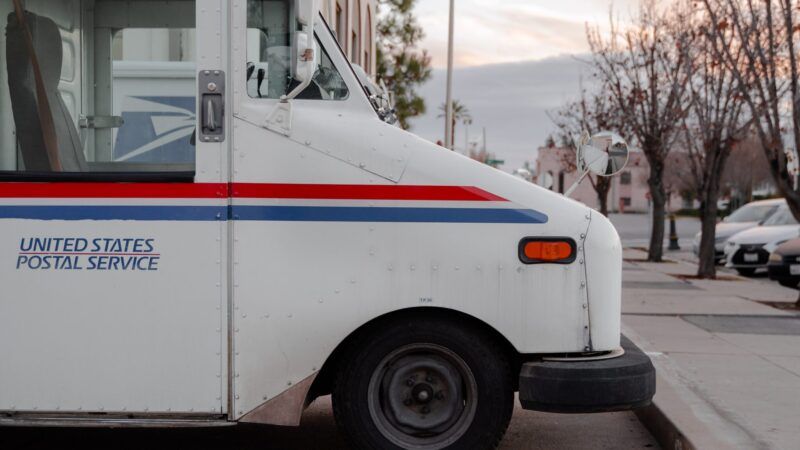Congress Wants Taxpayers To Bail Out the Postal Service
The House passed the bill this week with little fanfare and broad bipartisan support.

A first-class stamp costs more than ever, and the U.S. Postal Service (USPS) recently received a $10 billion loan from the federal government as part of a major pandemic relief package passed in 2020.
Now, Congress might force taxpayers to cover the cost of retired postal workers' health care—something for which the supposedly self-financing agency has always been responsible.
With little fanfare and broad bipartisan support, the House of Representatives voted earlier this week to pass the Postal Relief Act of 2022. The bill sweeps retired postal workers into the already strained Medicare system, whether they want to join or not, and excuses the USPS of having to self-fund health benefits for its retirees.
The Washington Post euphemistically describes the arrangement as "relieving [USPS] of tens of billions of dollars in liabilities" and says the bill "wipes clean $57 billion of" future health care costs the USPS expected to have to pay. Of course, those liabilities will still exist—retired postal workers will get routine medical care, require hospitalization, receive prescriptions, and the like—but those costs will no longer show up on the service's ledger. Instead, it will be the rest of the American work force, which funds Medicare via payroll taxes, footing the bill.
There's no doubt that the USPS is in need of a serious overhaul. It's been hemorrhaging money for years—more than $78 billion in red ink since 2007—thanks to a business model that the Government Accountability Office has termed "unsustainable."
But it's unclear how this latest plan will address the underlying problems. The USPS and the union that represents postal workers seem more interested in shifting costs onto taxpayers—something they are also trying to do with the USPS's massive pension obligations—than make the changes necessary to keep this monopolistic, archaic government service functional.
Many of the USPS's underlying problems stem from an "inability to adapt to changing markets, congressional impediments, and union quagmires," wrote a collection of conservative and free market groups in a letter to Congress opposing the Postal Service Reform Act. "Many of the reforms provided for in H.R. 756 lead USPS further away from the core mission of mail delivery, unfairly shift the Postal Service's financial burdens onto the American public, and fail to address many of the underlying issues facing USPS."
As Reason's Christian Britschgi wrote last year in a feature-length exploration of the USPS's many, many issues, the idea to put retired postal workers into Medicare doesn't make much sense for anyone. "If the USPS stops putting money down today to cover tomorrow's retiree benefits, there are obvious risks for both postal workers, whose pensions would be less secure, and taxpayers, who could be called on to cover the costs of these unfunded obligations whenever the bill comes due," Britschgi explained.
That's doubly true because Medicare is also on shaky fiscal ground. Parts of the program are on track to be insolvent—meaning that Medicare will be unable to pay the full cost of promised benefits—in less than five years.
It wouldn't be accurate to describe Congress' plan to shift workers from the underfunded USPS health care plan into Medicare as rearranging the deck chairs on the Titanic. No, it's more like moving deck chairs from the Titanic to the Lusitania.


Show Comments (162)